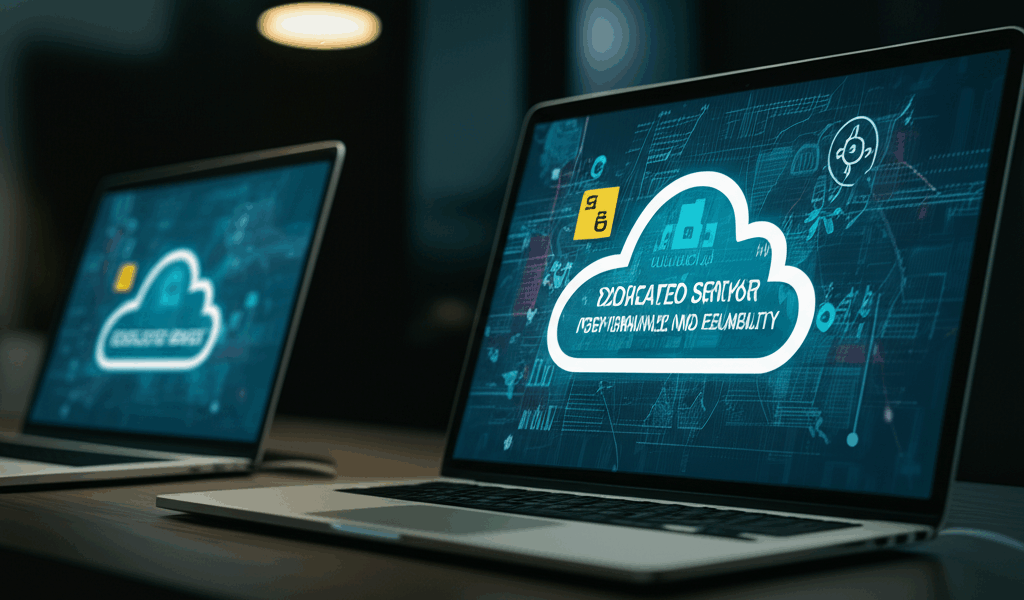Dedicated Server
Dedicated Server
When it comes to web hosting, a dedicated server represents the pinnacle of performance and control. It is a physical server dedicated exclusively to a single user or organization. This means all hardware resources are used only by the tenant. This offers several advantages over shared hosting or virtual private servers.
Why Choose a Dedicated Server?
Organizations often opt for dedicated servers for their high performance and reliability. A dedicated server provides full control over the server environment, including choice of operating system, hardware, and software configuration. This leads to enhanced performance, security, and customization options.
Performance

The primary advantage is guaranteed resources. There is no sharing of RAM, CPU, or storage with other users. This ensures consistent performance. High traffic websites, large databases, and enterprise applications can run without interruptions.
Security
Dedicated servers provide robust security measures. Since no other user has access to the server, the risk of malware or malicious attacks diminishes. Administrators can implement custom security protocols, including firewalls, anti-virus software, and regular security audits.
Customization
Users have full control over the server’s configuration. They can install any software, script, or operating system compatible with the hardware. This allows for an environment tailored specifically to the needs of the business or application.
Components of a Dedicated Server
- CPU: The processor is critical for performance. Options range from single-core to multi-core processors, with brands like Intel and AMD leading the market.
- RAM: Memory is essential for multitasking and handling data. More RAM means better performance, especially for high-traffic websites or complex applications.
- Storage: Choices include HDDs and SSDs. SSDs offer better performance and reliability. Storage capacity varies according to needs, from a few hundred gigabytes to several terabytes.
- Network: Bandwidth and connectivity are crucial for a dedicated server. High bandwidth ensures faster data transfer and better user experience.
- Operating System: Options include both Linux (Ubuntu, CentOS) and Windows. The choice depends on the server’s purpose and user preference.
Setting Up a Dedicated Server
Initial setup involves selecting the hardware specifications. Providers often allow customization. Choose components based on expected traffic and application requirements. After hardware selection, the operating system installation follows. Depending on the choice, configuration steps will vary.
Providers
Numerous hosting companies offer dedicated server solutions. Reputable providers include:
- Amazon Web Services (AWS)
- Google Cloud Platform
- Microsoft Azure
- Bluehost
- HostGator
These providers offer scalable options, professional support, and varying levels of server management services.
Managed vs. Unmanaged Servers
Users can choose between managed and unmanaged servers. A managed server includes support services such as maintenance, monitoring, and updates. This is ideal for users who lack technical expertise or prefer focusing on their core business rather than server management. Unmanaged servers offer complete control to the user, suitable for those with technical expertise and who prefer hands-on management.
Use Cases for Dedicated Servers
- High Traffic Websites: Websites with millions of visitors require reliable, high-performance servers to ensure uptime and quick load times.
- Enterprise Applications: Businesses running ERP, CRM, or other critical applications benefit from dedicated resources and enhanced security.
- Game Servers: Gaming requires real-time processing and low latency, making dedicated servers ideal.
- Data Storage: Organizations with large volumes of data need reliable, secure storage solutions.
- Media Hosting: Streaming services benefit from the high bandwidth and storage capabilities of dedicated servers.
Costs and Considerations
The cost of a dedicated server varies based on hardware specifications and the level of service provided. Entry-level servers might start at around $100 per month, while high-end configurations can exceed $1000 per month. Always consider additional costs such as software licenses, support services, and potential upgrades.
Selecting a dedicated server involves a balance between performance requirements and budget constraints. It’s vital to assess the current and future needs of your business or application. A well-chosen dedicated server can provide the necessary resources and stability for growth and success.



